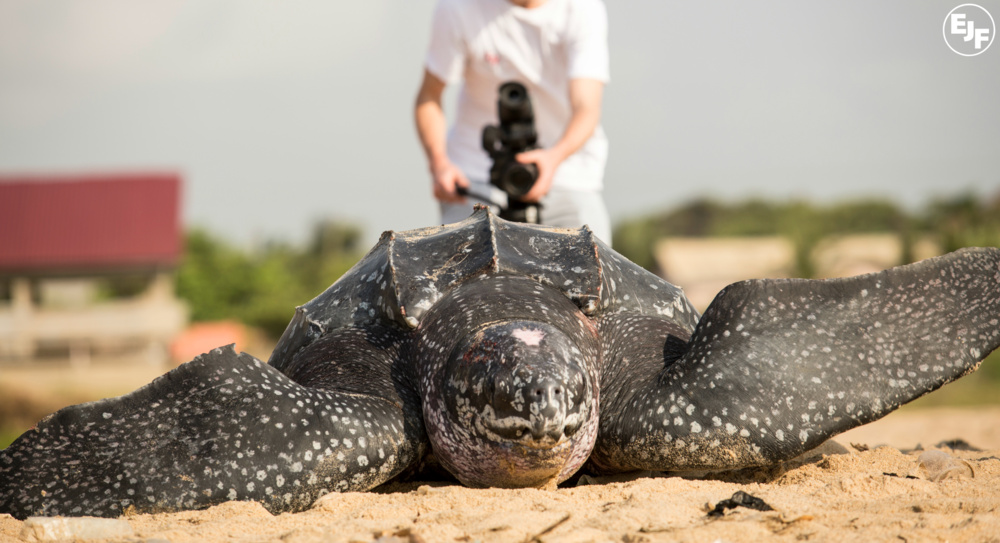
My marathon run for turtles
Leatherback turtles used to be abundant in Ghana’s Volta Region. A generation ago, at certain times of the year, the moonlit beaches of Dzita and Savietua would be alive with turtles hauling themselves out of the surf and onto the sand to lay their eggs.
Sadly, this is no longer the case. Across West Africa, turtle numbers have been devastated. From habitat destruction to fishing nets and shore-based poaching, they face threats at every stage of life.
Late last year on a trip to Ghana, EJF staff rescued and filmed the release of a female leatherback turtle in Savietua, a village in the Keta lagoon protected area, three hours East from Ghana’s capital city Accra. We were called at sunrise by a community informant, who told us that a leatherback turtle had been captured in the night and was about to be killed for meat. We arrived at the site to discover the distressed turtle bound with rope and turned on its back. The poachers had fled. With the help of local fishermen, we helped get the turtle back to sea where it swam to safety. You can watch footage of the rescue here.
Most captured turtles are not rescued, but killed for meat. From talking to local fishermen in Ghana, I learned that as illegal industrial pirate fishing vessels deplete fish stocks in West Africa’s waters, many people are left with no choice but to turn to alternative food sources for protein - including endangered sea turtles.
EJF has been working for many years with local fishing communities in West Africa to end illegal pirate fishing and promote the protection of endangered and sensitive marine species including turtles. We work in Grand Cess, Liberia during the sea turtle nesting season to protect turtles and their eggs from poachers; organising night patrols on the beaches in cooperation with local authorities and raising awareness of the importance of marine conservation amongst fishing communities.
Now, EJF is launching a special project to protect endangered sea turtles in Ghana. This means establishing night patrols, monitoring turtle numbers and continuing our work to combat illegal pirate fishing.
I spoke to Rafael Ahumah, a Ghanaian turtle conservation worker, who told me:
“Turtles are a very endangered animal. If we don’t take care, very soon, within 10 to 20 years time, there will be no more turtles.”
Hearing testimonies from people whose lives have been affected by pirate fishing, and who have witnessed first-hand the decline of turtles in the region, I was inspired to do whatever I can to help.
That’s why I’m running the London Marathon in April to help raise money for EJF’s project to protect sea turtles in Ghana. We’re also continuing our campaign to end illegal fishing, which is affecting the food sources of so many coastal communities by depleting precious fish stocks. I’d really appreciate your support. Please give whatever you can to help us ensure that turtles will be around for many more years to come.
SIGN UP FOR OUR EMAILS AND STAY UP TO DATE WITH EJF